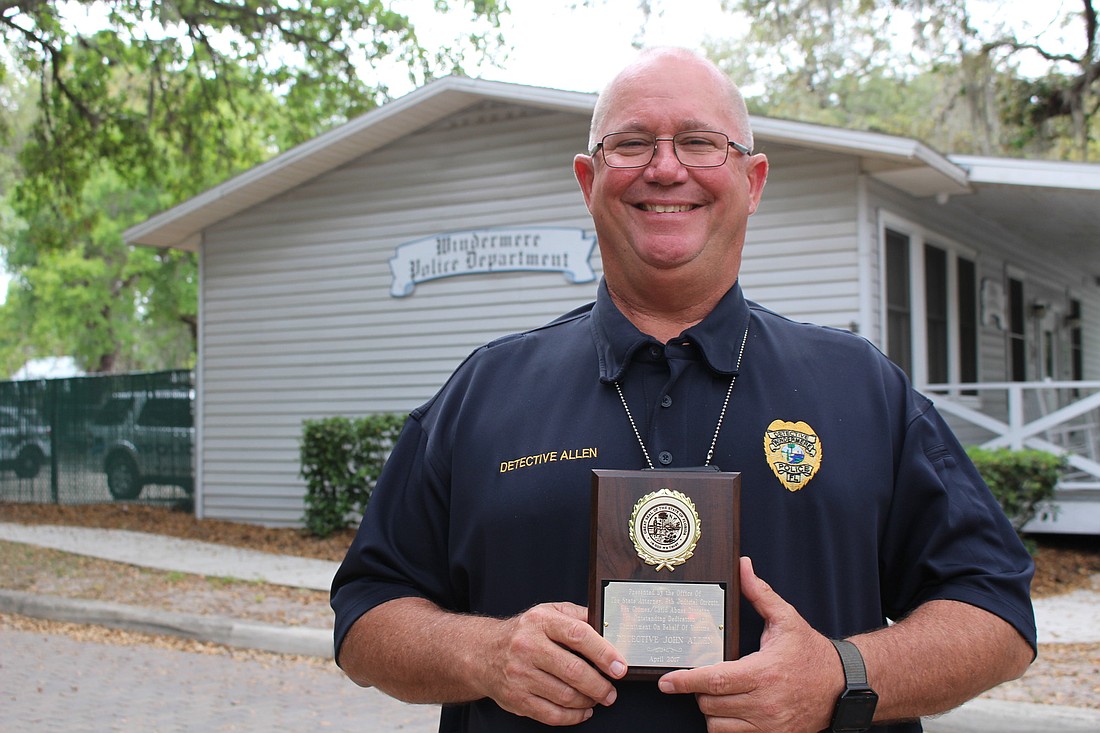- April 25, 2024
-
-
Loading

Loading

WINDERMERE – John Allen has been solving crimes for a long time, and although he is officially retired, Allen is still putting his skills to use as a detective for the Windermere Police Department.
With 38 years of law-enforcement experience, his accomplishments and the list of positions he’s held throughout his career fill several pages. But a recent success solving a sex crime case is what earned him an award and recognition by the Office of the State Attorney, Ninth Judicial Circuit.
Given to one individual every year for their work protecting sexual-abuse victims, the award was presented to Allen during the Annual Victim’s Rights Breakfast on April 6 for his hard work on the Darryl Patterson case.
Shortly after being hired by WPD in 2014, Allen found graphic tapes depicting a sexual crime in the department’s storage area. Inquiries into what happened with the case resulted in disappointing answers: He learned the department’s previous management had neglected to fully follow up on the case.
Allen, unable to stand the thought that a criminal who had recorded himself raping unconscious women still was walking free, quickly got to work.
“The detective who had the case at the time didn’t do much with it, and I found out about it just a few months after I got here,” Allen said. “There was concern on our part, because when you watch these videos, these women were completely unconscious. And when you watch these videos, you think, ‘My God, did all these women survive?’”
After working to identify the women in the tapes, Allen learned the women had survived but had no idea what had happened. However, after working as a detective for OCSO from 1981 to 2014, including homicides and sex crimes, Allen was no stranger on how to make a strong enough case to validate an arrest warrant.
It took a while to develop enough information and evidence against Patterson, but Patterson eventually was charged with three crimes and arrested on June 1, 2016. He currently is in jail awaiting trial.
“People used to ask me when I was working on sex crimes for Orange County — how can you talk to these guys,” Allen said. “But the answer is pretty simple: You do it because it helps the case. You do it because if the person confesses, now you’ve reduced the likelihood that the victim is going to have to get up on the stand and tell that story all over again.”
According to Allen’s philosophy, every case matters, but some cases are more challenging than others, depending on the circumstances.
“Each type of case has a different set of problems. … Some cases are pretty easy,” he said. “If you work a murder and some guy loses his temper and shoots his wife in front of 14 witnesses and we show up and there’s the guy standing there with the gun, that’s a pretty easy case to solve. But if you find a woman on the side of the road dead, and she’s got no identification and you have absolutely no idea who she is, that’s a tough one. We’ve worked cases where all we had starting off was a skeleton.”
Allen said there’s no formula to solving cases, but talking to people in a way that gets them to open up and confess, along with patience, knowledge of different cultures and even social-media basics can go a long way in any investigation.
“We spend a large percentage of our time talking to people and writing down what they say, like a reporter,” Allen said. “So the ability to make people comfortable talking to you and getting them to tell you the truth is a big part.”
Some investigations take longer than others and require out-of-state travel. While working for OCSO and the FBI’s Joint Terrorism Task Force before he retired, Allen traveled to several states and countries to locate potential witnesses and suspects.
But the work, while demanding, is well worth it, because every bit of information goes toward gathering enough evidence to finish the puzzle of a crime and validate a charge against a criminal.
“Sometimes, it’s just all about putting the puzzle together,” Allen said. “It’s rewarding to start — sometimes with very little — and put the pieces together to figure out what happened.”
–––
Contact Gabby Baquero at [email protected].